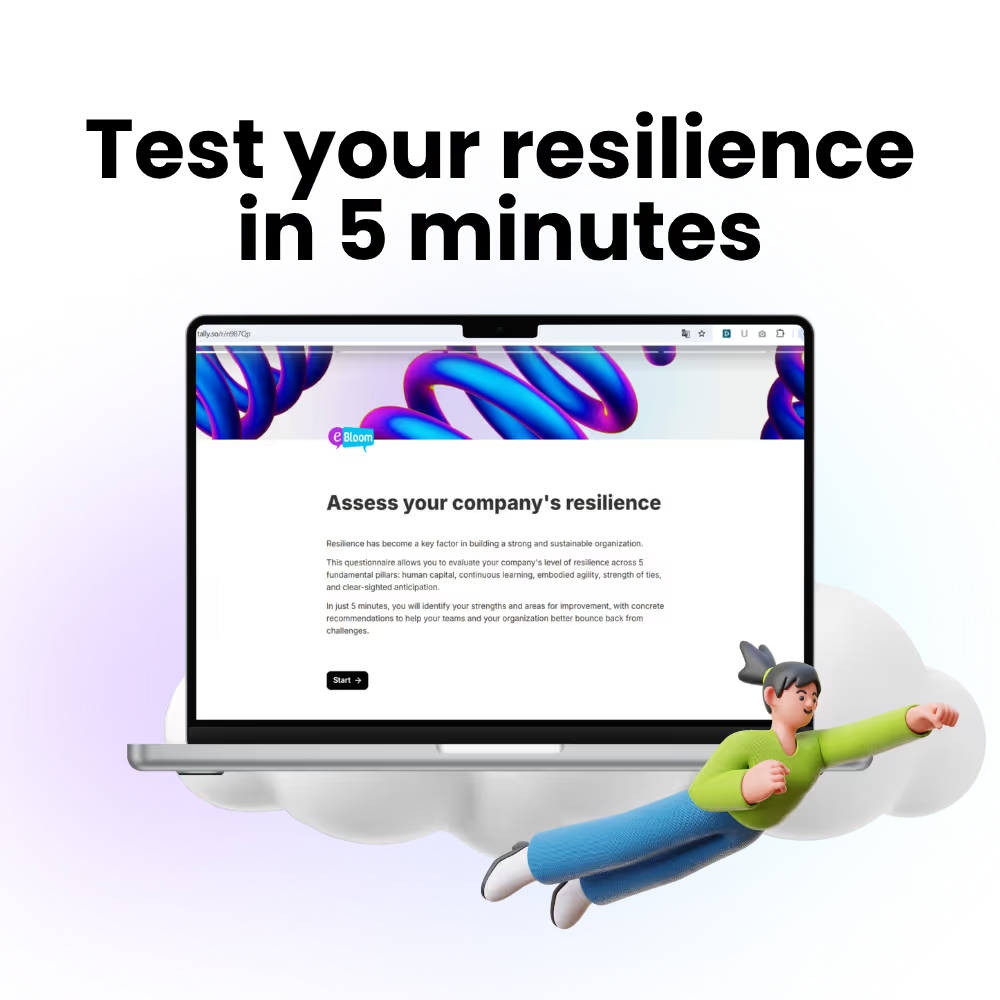
The world continues to sway between health crises, geopolitical tensions, climate upheavals, and technological waves. What once was exceptional has now become the norm: uncertainty.
In this shifting landscape, one question keeps coming back: how can we stay the course without burning out? At eBloom, we’re convinced: the key isn’t avoiding turbulence, but learning to navigate it, with agility, clarity… and humanity.
This is the essence of organizational resilience. Not a rigid stance in the face of adversity, but a capacity to absorb shocks, adapt quickly, and bounce back stronger. A strength that some companies already cultivate daily and that tomorrow, could make all the difference.
Resilience is often confused with resistance. But a resilient company doesn’t try to avoid crises. It anticipates them, prepares for them, and learns to bounce back, again and again.
Being resilient in business doesn’t mean ignoring the unexpected, it means being ready for it, adapting to it, and emerging stronger. It’s an organization that, when faced with a cyberattack, an economic downturn, or a sudden regulatory shift, doesn’t freeze: it observes, reacts, adjusts, and moves forward.
But above all, resilience isn’t something you improvise once a crisis hits. It’s built upstream, over time, through a clear culture and solid practices. That’s the foundation that makes all the difference when the storm hits.
Resilience can’t be decreed. It’s built step by step, through daily choices, trust-based relationships, and the ability to face challenges together. Here are the five pillars shared by organizations that not only weather storms but grow stronger through them.
Let’s be clear: a resilient company is not a perfect company.
It makes mistakes, hesitates, and fumbles at times. But it holds on to one crucial trait: the ability to bounce back without losing sight of its values. And often, it’s that shared, embraced imperfection that sparks true engagement.
Geopolitical tensions, climate crises, overnight regulatory shifts, jobs transformed by AI… The professional world is evolving at unprecedented, and often dizzying, speed.
In this environment, companies no longer have the luxury to “pause” and reflect. They must move forward, adjust, understand, decide. And above all: stay connected to their teams. Because behind every transformation are people who are doubting, adapting, innovating… or disengaging.
In 2025, resilience is no longer a “nice-to-have.” It’s a survival skill. Even better, it’s a lever to navigate change with clarity, coherence, and humanity.
“Global Crisis and Resilience Survey reveals that 89% of business leaders consider resilience to be one of their most important strategic organizational priorities and that 93% have established an executive sponsorship from the C-suite for their resilience programs.” (PWC)
The good news? Resilience doesn’t rely solely on gut feeling or experience. There’s an international framework to strengthen it: ISO 22316:2017.
This standard isn’t a one-size-fits-all solution, but rather a foundation of principles that any organization can apply. The goal? Create an environment where it’s possible to absorb shocks, adapt flexibly, and keep moving forward.
It highlights several key foundations:
In short: ISO 22316 is a great starting point… but it’s real-world practices that make the difference.
Resilience isn’t a dusty crisis plan sitting in a drawer. It’s a living dynamic, driven by teams, managers, and well-timed decisions.
At eBloom, we don’t just talk about resilience: we help organizations embody it day to day, through a suite of HR tools designed for people.
With its human-centric HR suite, eBloom enables organizations to:
By making these levers practical and actionable, eBloom helps organizations go from talking about resilience… to building a culture that lives it.
Today, resilience is no longer optional. It’s a collective skill, a mindset, and a driver of transformation. The organizations that will stand out are those that can anticipate without panicking, adapt without compromising their values, and grow without burning out.
But beware: it’s not enough to say you’re resilient. You have to live it at every level, through practices, tools, and human relationships. That’s where robust frameworks like ISO 22316 reveal their true value: when they’re brought to life on the ground.
At eBloom, that’s exactly our mission: helping companies embed this capacity to adapt and grow into their daily reality, with practical, human, and engaging tools.
Because a resilient company isn’t the one that breezes through the storm unshaken. It’s the one that stays aligned, clear-headed, and united, even when everything around it changes.

.avif)



